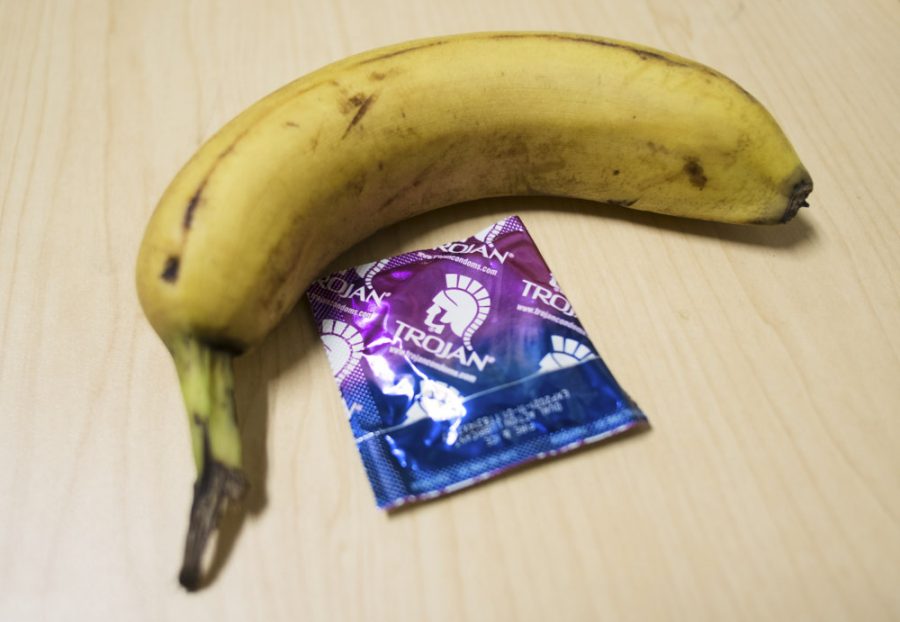Photo Illustration by Jacky Chen
Being safe without sex-ed
Students harmed by misinformation, ignorance regarding sex

Many students remember the days in their high school health classroom, the teacher prattling on about the human reproductive systems over the unmistakable sound of teenagers giggling in the back.
Freshman ecology major Damarisse Valladares went through her academic career without any formal sex education. Like many students who came into college without a substantial sexual education, Valladares is put at risk and unable to fully comprehend what unknown health concerns and unsafe practices could come up in her future.
“If I just had what my school had given me, I would be in the unknown on something I feel like you should know. These are things that you should know as a human being and as a young adult,” Valladares said.
Without this knowledge, students can be left misinformed, unsafe or even victims of a shame culture that stigmatizes conversations on sexual health and issues.
Colleges like Seattle Pacific University could provide safety to students by granting them easy access to sex education resources and promoting awareness through the student body, Valladares said.
Some students, like freshman politics, philosophy and economics major Maddie Hayden and sophomore political science, history and honors liberal arts major Cambria Babbitt, had fairly thorough sex educations. For them, sex-ed was a standard class (or classes) they simply had to pass years ago.
But some students never got that experience — at least, not the full one.
Freshman Asian studies major Mariah Olson is another student who went through school without a proper sex education. She recalled learning about menstruation in elementary school, but received no further formal education.
Olson believes that having a sex education, and having medical or academic professionals available to discuss it, is important. Talking about sex, and especially STDs, Olson said, is still considered taboo in many societies, including American society.
Avoiding the discussion about sex and its consequences leaves people unaware and unsafe, Olson said. The culture of shame surrounding sex is only worsened when that discussion is not taken seriously.
“If STDs or treatment aren’t talked about seriously, and it’s just skimmed over and you don’t get to know much about it, then things like shaming are bound to happen,” Olson said.
Sophomore computer science major Jordan Mielbrecht is another student who went without a proper sex education, only receiving knowledge of the basics of the reproductive system like menstruation. He agreed that a lack of knowledge leads to shame placed on those without any way to know better.
“If STDs are contracted it’s like, well, you didn’t do the adequate research, you should have researched this more,” Mielbrecht said.
Mielbrecht added that his personal lack of knowledge around sex-ed extends to its consequences.
He believes these repercussions can affect people in more ways than just victimization in shame culture; sexually transmitted diseases and pregnancy could disrupt a student’s life, education and career.
“I don’t know what would happen if, hypothetically, someone I know was pregnant while on campus … I would imagine that would create a lot of fear, not just stigmatization, not just shame, but fear,” Mielbrecht said.
Hayden, having learned about STDs in the past, added that a lack of education surrounding topics like STDs could lead to health hazards not just for the person who contracted them, but also for the people around them.
A contagious condition resulting from ignorance about sex could escalate the fear of punishment and isolation that Mielbrecht discussed.
“If you do end up getting something that’s super contagious, it’s important to know these things so you don’t spread it. Knowing how to treat it and everything is kind of a big deal,” Hayden said.
Knowing about sex and having a proper sex education is something some students here at SPU have found themselves lacking in.
Hayden added that having access to sex-ed, even at a later point in their academic career, could help prevent fear in students and keep them safe.
These students stressed that, while SPU does not need to change the policy on sex, they should offer accessible sex-ed resources on campus or online.
As possible solutions, students who were interviewed suggested that students or clubs could come together to spread awareness or Student Health Services could offer resources for topics like STDs/STIs, pregnancies and other sexual health resources.
“If students wanted to organize around that, like clubs on campus using their platform for sharing body openness, I think that’d be a good thing for raising information,” Babbitt said.
